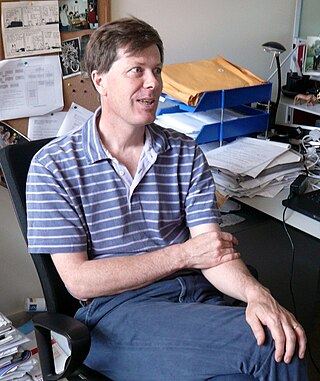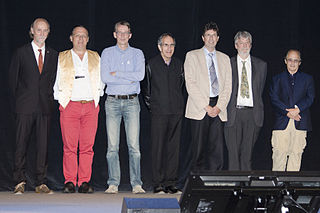Related Research Articles
The Protein Data Bank (PDB) is a database for the three-dimensional structural data of large biological molecules, such as proteins and nucleic acids. The data, typically obtained by X-ray crystallography, NMR spectroscopy, or, increasingly, cryo-electron microscopy, and submitted by biologists and biochemists from around the world, are freely accessible on the Internet via the websites of its member organisations. The PDB is overseen by an organization called the Worldwide Protein Data Bank, wwPDB.

DNA polymerase I is an enzyme that participates in the process of prokaryotic DNA replication. Discovered by Arthur Kornberg in 1956, it was the first known DNA polymerase. It was initially characterized in E. coli and is ubiquitous in prokaryotes. In E. coli and many other bacteria, the gene that encodes Pol I is known as polA. The E. coli Pol I enzyme is composed of 928 amino acids, and is an example of a processive enzyme — it can sequentially catalyze multiple polymerisation steps without releasing the single-stranded template. The physiological function of Pol I is mainly to support repair of damaged DNA, but it also contributes to connecting Okazaki fragments by deleting RNA primers and replacing the ribonucleotides with DNA.

The Wellcome Sanger Institute, previously known as The Sanger Centre and Wellcome Trust Sanger Institute, is a non-profit British genomics and genetics research institute, primarily funded by the Wellcome Trust.
The European Bioinformatics Institute (EMBL-EBI) is an Intergovernmental Organization (IGO) which, as part of the European Molecular Biology Laboratory (EMBL) family, focuses on research and services in bioinformatics. It is located on the Wellcome Genome Campus in Hinxton near Cambridge, and employs over 600 full-time equivalent (FTE) staff. Institute leaders such as Rolf Apweiler, Alex Bateman, Ewan Birney, and Guy Cochrane, an adviser on the National Genomics Data Center Scientific Advisory Board, serve as part of the international research network of the BIG Data Center at the Beijing Institute of Genomics.

John Frederick William Birney is joint director with Rolf Apweiler of EMBL's European Bioinformatics Institute (EMBL-EBI), in Hinxton, Cambridgeshire and deputy director general of the European Molecular Biology Laboratory (EMBL). He also serves as non-executive director of Genomics England, chair of the Global Alliance for Genomics and Health (GA4GH) and honorary professor of bioinformatics at the University of Cambridge. Birney has made significant contributions to genomics, through his development of innovative bioinformatics and computational biology tools. He previously served as an associate faculty member at the Wellcome Trust Sanger Institute.
InterPro is a database of protein families, domains and functional sites in which identifiable features found in known proteins can be applied to new protein sequences in order to functionally characterise them.

Richard Michael Durbin, FRS, born 30 December 1960, is a British computational biologist. He is currently an Associate Faculty member at the Wellcome Trust Sanger Institute and Professor of Genetics at the University of Cambridge. Previously, he was Senior Group Leader at the Wellcome Trust Sanger Institute for over 20 years and an Honorary Professor of Computational genomics at the University of Cambridge.

ChEMBL or ChEMBLdb is a manually curated chemical database of bioactive molecules with drug-like properties. It is maintained by the European Bioinformatics Institute (EBI), of the European Molecular Biology Laboratory (EMBL), based at the Wellcome Trust Genome Campus, Hinxton, UK.

The Sequence Read Archive is a bioinformatics database that provides a public repository for DNA sequencing data, especially the "short reads" generated by high-throughput sequencing, which are typically less than 1,000 base pairs in length. The archive is part of the International Nucleotide Sequence Database Collaboration (INSDC), and run as a collaboration between the NCBI, the European Bioinformatics Institute (EBI), and the DNA Data Bank of Japan (DDBJ).

Rolf Apweiler is a director of European Bioinformatics Institute (EBI) part of the European Molecular Biology Laboratory (EMBL) with Ewan Birney.

The European Nucleotide Archive (ENA) is a repository providing free and unrestricted access to annotated DNA and RNA sequences. It also stores complementary information such as experimental procedures, details of sequence assembly and other metadata related to sequencing projects. The archive is composed of three main databases: the Sequence Read Archive, the Trace Archive and the EMBL Nucleotide Sequence Database. The ENA is produced and maintained by the European Bioinformatics Institute and is a member of the International Nucleotide Sequence Database Collaboration (INSDC) along with the DNA Data Bank of Japan and GenBank.
DNA digital data storage is the process of encoding and decoding binary data to and from synthesized strands of DNA.

Timothy John Phillip Hubbard is a Professor of Bioinformatics at King's College London, Head of Genome Analysis at Genomics England and Honorary Faculty at the Wellcome Trust Sanger Institute in Cambridge, UK.

Experimental factor ontology, also known as EFO, is an open-access ontology of experimental variables particularly those used in molecular biology. The ontology covers variables which include aspects of disease, anatomy, cell type, cell lines, chemical compounds and assay information. EFO is developed and maintained at the EMBL-EBI as a cross-cutting resource for the purposes of curation, querying and data integration in resources such as Ensembl, ChEMBL and Expression Atlas.

Alexander George Bateman is a computational biologist and Head of Protein Sequence Resources at the European Bioinformatics Institute (EBI), part of the European Molecular Biology Laboratory (EMBL) in Cambridge, UK. He has led the development of the Pfam biological database and introduced the Rfam database of RNA families. He has also been involved in the use of Wikipedia for community-based annotation of biological databases.

Sarah Amalia Teichmann is a German scientist who is head of cellular genetics at the Wellcome Sanger Institute and a visiting research group leader at the European Bioinformatics Institute (EMBL-EBI). She serves as director of research in the Cavendish Laboratory, at the University of Cambridge and a senior research fellow at Churchill College, Cambridge.
Identification of genomic regulatory elements is essential for understanding the dynamics of developmental, physiological and pathological processes. Recent advances in chromatin immunoprecipitation followed by sequencing (ChIP-seq) have provided powerful ways to identify genome-wide profiling of DNA-binding proteins and histone modifications. The application of ChIP-seq methods has reliably discovered transcription factor binding sites and histone modification sites.
Toby James Gibson is a group leader and biochemist at the European Molecular Biology Laboratory (EMBL) in Heidelberg known for his work on Clustal. According to Nature, Gibson's co-authored papers describing Clustal are among the top ten most highly cited scientific papers of all time.

Christophe Dessimoz is a Swiss National Science Foundation (SNSF) Professor at the University of Lausanne, Associate Professor at University College London and a group leader at the Swiss Institute of Bioinformatics. He was awarded the Overton Prize in 2019 for his contributions to computational biology.
Emily Leproust is an American scientist and entrepreneur. She is the CEO and co-founder of Twist Bioscience, a public company working on DNA synthesis. The company harnesses synthetic biology, providing tools to manufacture insulin from yeast, to tackle malaria, produce spider silk at scale or store information on DNA. She was awarded the BIO Rosalind Franklin Award in 2020.
References
- ↑ "Nick Goldman". European Bioinformatics Institute . Retrieved 2019-04-08.
- ↑ "Goldman group". European Bioinformatics Institute. Retrieved 2019-04-08.
- ↑ Goldman, Nick; Bertone, Paul; Chen, Siyuan; Dessimoz, Christophe; LeProust, Emily M.; Sipos, Botond; Birney, Ewan (February 2013). "Towards practical, high-capacity, low-maintenance information storage in synthesized DNA". Nature . 494 (7435): 77–80. doi:10.1038/nature11875. ISSN 0028-0836. PMC 3672958 . PMID 23354052.
- ↑ Yong, Ed (2013-01-23). "Synthetic double-helix faithfully stores Shakespeare's sonnets". Nature News . doi:10.1038/nature.2013.12279 . Retrieved 2019-04-08.
- ↑ Yong, Ed (2017-03-02). "This Speck of DNA Contains a Movie, a Computer Virus, and an Amazon Gift Card". The Atlantic . Retrieved 2019-04-08.
- ↑ Markoff, John (2013-01-28). "Using DNA to Store Digital Information". The New York Times . ISSN 0362-4331 . Retrieved 2019-04-08.